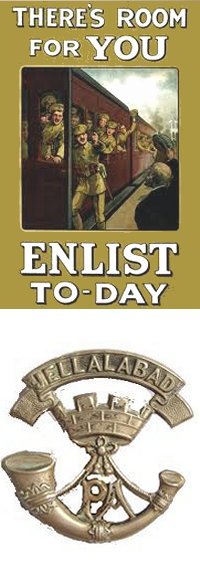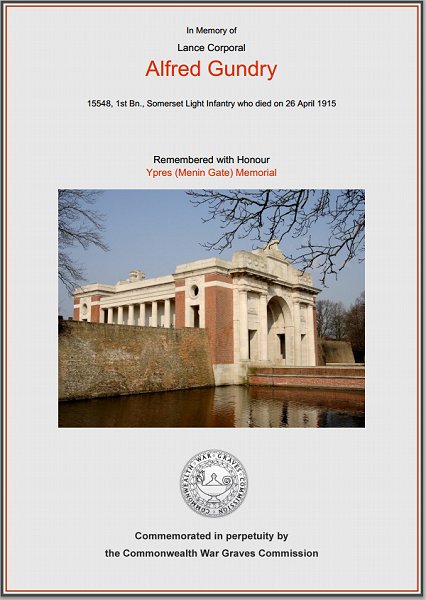yeovil at War
Alfred John Gundry
Killed in action during the Second battle of Ypres
Alfred John Gundry was born in April 1882 at Bradpole, near Bridport, Dorset, and baptised at Bradpole on 7 May 1882. He was the son of agricultural labourer Frederick Gundry (b 1853) and his wife Mary Hannah (b 1857). By the time of the 1901 census Frederick and Mary had moved their family to Bradford Abbas, just south of Yeovil. Living with them were their eight children; Annie born 1881, Alfred born 1882, Joseph born 1886, John born 1890, Walter born 1894, George born 1896, Bessie born 1899 and Henry born 1900. The family had clearly moved around since their children had been born at five different locations. In this census Alfred listed his occupation as a labourer on a farm.
The family soon moved to Preston Plucknett, Yeovil, and for five years Alfred worked at Chaplin & Co in Yeovil but by the time of the 1911 census he was working as a railway shunter at the GWR goods station at Hendford. In the census Frederick listed his occupation as a shepherd while three of his sons, Joseph, John and Walter were all employed as farm labourers and George was employed as a house-boy at the Bell Inn.
 When
war broke out
Alfred left his
job in the
Hendford goods
yard and
enlisted in 1st
Battalion,
Somerset Light
Infantry as
Private Alfred
Gundry (Service
No 15548). He
was initially
stationed at
Plymouth for his
basic training.
When
war broke out
Alfred left his
job in the
Hendford goods
yard and
enlisted in 1st
Battalion,
Somerset Light
Infantry as
Private Alfred
Gundry (Service
No 15548). He
was initially
stationed at
Plymouth for his
basic training.
At the outbreak of war in 1914 the 1st Battalion was with 11th Brigade, 4th Division. The Battalion landed at Le Havre, France with the British Expeditionary Force (BEF) on 22 August 1914 and remained on the Western Front with 4th Division, throughout the war, suffering 1,315 losses.
Alfred joined his Battalion in France on 6 April 1915 at which time his unit was preparing for the Second Battle of Ypres. He was soon promoted to Lance Corporal, probably as much because of his age as well as his ability.
The Second Battle of Ypres, 22 April-25 May 1915, was a rare German offensive on the Western Front during 1915. It was launched with two aims in mind. The first was to distract attention from the movement of German troops to the eastern front in preparation for the campaign that would lead to the victory of Gorlice-Tarnow. The second was to assess the impact of poisoned gas on the western front. Gas had already been used on the eastern front, at Bolimov (3 January 1915), but the tear gas used there had frozen in the extreme cold. At Ypres the Germans used the first lethal gas of the war, chlorine. The gas was to be released from 6,000 cylinders and would rely on the wind to blow it over the allied trenches. This method of delivery controlled the timing of the attack – the prevailing winds on the western front came from the west, so the Germans had to wait for a suitable wind from the east to launch their attack. The line around Ypres was held by French, Canadian and British troops. The attack on 22 April hit the French lines worst and, not surprisingly, the line broke under the impact of this deadly new weapon. The gas created a gap 8,000 yards long in the Allied lines north of Ypres. The success of their gas had surprised the Germans who didn’t have the reserves to quickly exploit the unexpected breakthrough, allowing enough time to plug the gap with newly arrived Canadian troops. During the battle the British, French and Canadians suffered 60,000 casualties, the Germans only 35,000.
The Regimental History of the Somerset Light Infantry takes up the story of the next few days "The 1st Somersets occupied and entrenched a line from Chappel in Fortuin to Hill 37.... Having reached their allotted positions the Battalion set to work to dig in as effectively as possible in the short time before dawn of the 26th broke, for with the coming of daylight it was certain they would be exposed to a merciless shelling. But as there was a scarcity of entrenching tools, and no Brigade tools were available, the 1st Somersets were only partly entrenched when morning arrived, and what trenches there were, were shallow and afforded little protection unless the troops laid down flat. Dawn broke at about 3:30am and it was not long before the Somerset men and other battalions of the 11th Brigade were spotted by the enemy. Immediately the whole Brigade line was plastered with shell, which continued falling heavily throughout the day. One battery absolutely enfiladed C Company's trench. The Germans kept the supporting trenches under a rain of shrapnel, so that the supports did not dare show their heads above the parapet, and searched the high ground behind with high explosives to stop movements of reserves. All day long nothing could be done but like close and make the best of a desperate situation.... The Somersets had, however, suffered about 40 casualties during the day." This included Lance Corporal Alfred Gundry who had only been in the front line for three weeks. He was aged 33.
On 14 May 1915 the Western Gazette reported "Mr and Mrs F Gundry, of this parish (Preston Plucknett), have been officially informed, that their second son, Lance Cpl Alfred Gundry, has been killed in action. The deceased soldier, who was 33 years of age, enlisted in the 3rd (sic) Somerset LI on the outbreak of hostilities and was stationed at Plymouth for training. He crossed to France on six April, but his services in the trenches was short, as he was killed on the 26th of the same month. Lance Cpl Gundry was in the employee of Messrs Chaplin & Co at Yeovil for five years, after which he was employed as a shunter at the GWR Goods Station at Hendford for a similar period, and which position he left to join the army. Mr and Mrs Gundry have three other sons serving their country. Joseph is with the Dorset Yeomanry on foreign service; water is stationed in the Eastern Counties with the West Somerset Yeomanry; and John recently sailed for France with the Somerset LI. They are the four brothers of Miss J Gundry, at the Half Moon Hotel, Sherborne."
Alfred Gundry is commemorated on Panel 21, Ypres (Menin Gate) Memorial, West-Vlaanderen, Belgium, and his name is inscribed on the Preston Plucknett War Memorial.
gallery

The Commonwealth War Graves Commission certificate in memory of Alfred Gundry.